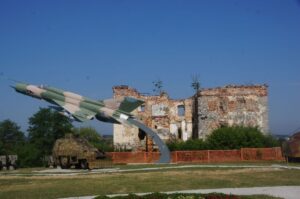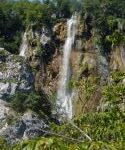July 27, 2013
Split from Zagreb—splitting to Split
We left Zagreb early this morning to make the 300 mile trip to our boat, anchored in the harbor at Split, Croatia’s second largest city. Split is located in Dalmatia, an area as different from northern Croatia as night is from day. Along the coast of the Adriatic, it’s an area even more influenced by the West (especially Italy and Venice) which has probably given Croatia more of a Western than an Eastern feel. In part due to the rivalry of Byzantium and Rome for supremacy in the Christian world, the pope allowed Croatia to use Golgolithic, the local language, long before the Vatican approved (wasn’t in the 20th century?) the use of the vernacular. Partly for that reason, Croatia is over 90% Catholic, rather than Orthodox, and one of the few Balkan countries that doesn’t use the Cyrillic alphabet.
 On the way, we made two interesting stops. One was in a “Military Border Area.” Once a border between the Austro-Hungarian Empire and the Ottomans, with a fort built for the purpose that turned the area into an important military center even after the Turkish threat faded, the area figured prominently in what young Croats call “The Homeland War.” When Yugoslavia collapsed in 1991, the Serbian-dominated army started a four year war to create an enlarged Serbia; Croatia and Slovenia declared their independence. Four years and 20,000 deaths later, the United States helped bring about peace in the area which resulted in the independence of the former Yugoslav states. The war museum we visited was mostly weapons from the period, but a reminder of the recent troubled history of the area. (Not to mention the Second World War, when the Germans created a puppet Croatia that was very pro-Nazi).
On the way, we made two interesting stops. One was in a “Military Border Area.” Once a border between the Austro-Hungarian Empire and the Ottomans, with a fort built for the purpose that turned the area into an important military center even after the Turkish threat faded, the area figured prominently in what young Croats call “The Homeland War.” When Yugoslavia collapsed in 1991, the Serbian-dominated army started a four year war to create an enlarged Serbia; Croatia and Slovenia declared their independence. Four years and 20,000 deaths later, the United States helped bring about peace in the area which resulted in the independence of the former Yugoslav states. The war museum we visited was mostly weapons from the period, but a reminder of the recent troubled history of the area. (Not to mention the Second World War, when the Germans created a puppet Croatia that was very pro-Nazi).
The other stop was at one of eight National Parks—a stunning alpine like 
 series of lakes and waterfalls with brilliant turquoise water—lots of fish clearly visible, and wall-to-wall people. It was both a Saturday and the beginning of European “holiday” season. With a sweltering heat wave in Europe, it’s no wonder many people are heading to the beaches, a lot of them going where we’re sailing after tomorrow.
series of lakes and waterfalls with brilliant turquoise water—lots of fish clearly visible, and wall-to-wall people. It was both a Saturday and the beginning of European “holiday” season. With a sweltering heat wave in Europe, it’s no wonder many people are heading to the beaches, a lot of them going where we’re sailing after tomorrow.
At least we’re off the highways, and onto the boat, a smallish one with about 50 passengers.